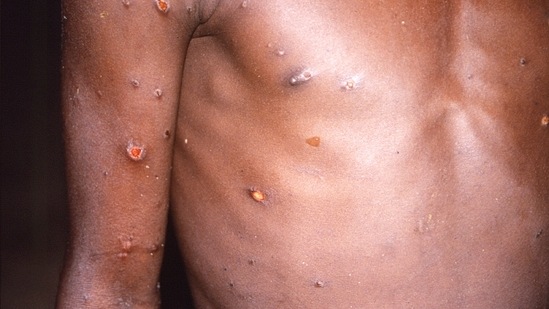Monkeypox claims fact-checked. No, virus not linked to Covid nor is it man-made
Monkeypox is a zoonotic disease that presents symptoms that include fever, an extensive characteristic rash and usually swollen lymph nodes, the WHO has said.
On May 7 the United Kingdom reported a confirmed case of the infection caused by the monkeypox virus. Since then over 550 cases have been reported in 30 countries - none of whom are in the regions of west and central Africa where the disease is endemic, according to the World Health Organization. Countries with confirmed cases include the UK and several in mainland Europe, as well as the United States and Canada.

As with the novel coronavirus, social media is now buzzing with claims about the monkeypox virus and, as with the coronavirus, many of these are not supported by the facts.
These include claims of a link between the AstraZeneca Covid-19 vaccine (sold in India as Covishield) and monkeypox because an adenovirus used in the former contains a type of virus derived from chimpanzees.
Below we fact-check three of these claims:
Claim: A Facebook post on May 26 by a page titled 'Louisiana Cajun Recipes' claims a link between the AstraZeneca vaccine and monkeypox.
The information in the post is genuine - it is from a UK government website on information about the AstraZeneca vaccine.
The post flags - 'Recombinant, replication-deficient chimpanzee adenovirus vector encoding the SARS CoV2 spike glycoprotein...' - and suggests the disease be called 'chimpanzeepox'.

Fact: Yes, the AstraZeneca vaccine does contain a virus from chimpanzees. No, it is not from the same family responsible for monkeypox, which comes from the line of viruses - called orthopoxviruses - that cause small pox
According to UK-based fact-checker Full Fact, adenoviruses are common viruses that typically cause a mild cold or flu-like illness. The virus in the AstraZeneca vaccine has been weakened and modified to ensure it does not cause a disease.
It is used as a vector to carry genetic info on Covid - which can be used by the body to create antibodies - and because it generates a strong immune response.
Claim: The disease caused by the monkeypox virus is actually shingles.
This was from a post by Twitter handle @ProjectTabs that said 'confirmed that 95% of Monkeypox cases are really shingles in Canada' and attached a screenshot of a CTV News headline to back its claim.

Fact: In the first place, shingles and the disease caused by the monkeypox virus are not the same. In fact, they are caused by two different viruses; shingles is caused by the varicella-zoster virus, which also causes chickenpox.
On the tweet itself, Reuters conducted an extensive fact-check to confirm CTV News - a leading Canadian news outlet - never published any such article.
The article in question does not appear on the CTV News website nor was any article with that specific headline published by any major news outlet.
Claim: The monkeypox virus was released from a lab - it is man-made. And it was released as a biological weapon - although claims differ on who released it.
Fact: No. There is no evidence to suggest the virus is man-made.
BBC News spoke to geneticist Fatima Tokhmafshan, a researcher with Canada's McGill University Health Centre, who said sequencing the virus' DNA 'tells us this is not something manufactured'. The virus, she said, can be traced to a strain that commonly circulates in west Africa.
Similarly, there is also no evidence the outbreak was 'planned' in any way.
READ: Monkeypox won't turn into pandemic, but many unknowns: WHO
One of these claims points a finger at the US-based Nuclear Threat Initiative and a 2021 workshop to help plan against possible future pandemics.
The fictional planning exercise included spread of the monkeypox virus.
So <strong>what is the monkeypox virus</strong> and disease?
Monkeypox is a viral infection with symptoms that include fever, an extensive characteristic rash and usually swollen lymph nodes, the World Health Organization (WHO) has said.
READ: Over 550 confirmed cases reported from 30 countries, says WHO
It is a zoonotic disease, meaning it transmits originally from animals to humans and can then be spread between humans.
READ: India to screen arrivals for monkeypox signs
Importantly, human-to-human transmission is limited, the WHO said, with the longest documented chain of transmission being six generations. This means the last person to be infected in this chain was six links away from 'patient zero'.
There are two main variants - the Congo strain, which has up to 10 per cent mortality, and the West African strain, which has a fatality rate of 1 per cent.
READ: Argentina, Ireland…: Which countries have monkeypox cases so far
Is there a vaccine?
No. But vaccines developed for smallpox have been found to be about 85 percent effective in preventing monkeypox. They are, though, in short supply.
WHO has not proposed mass-vaccination at this time, but rather targeted use to protect health workers and those most at risk of infection.
With input from AFP, Reuters, PTI






